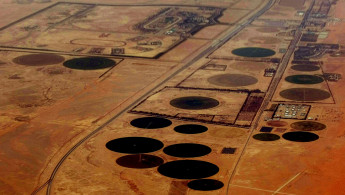Saudi Arabia ends its decades-long experiment in feeding itself
In a dramatic turnaround Saudi Arabia, once one of the world’s top ten wheat exporters, is set to halt almost all wheat production next year.
In 2016 the oil-rich desert kingdom will import almost all of the wheat it needs to feed its own population, becoming yet another Middle Eastern state that "sells hydrocarbons to buy carbohydrates", Bloomberg reported on Wednesday.
In stark contrast, in the early 1990s, kingdom produced enough wheat to feed its own population and those of its Gulf neighbours - Kuwait, the UAE, Qatar, Bahrain, Oman and Yemen.
Saudi Arabia's rise to be one of the world’s top wheat producers is ultimately a story about the kingdom’s vast oil wealth.
The collapse of Saudi agriculture over the last few years is a lesson in the environmental limits of agriculture in the kingdom’s harsh desert environment.
An unsustainable agricultural boom
| The collapse of Saudi agriculture is a lesson in the environmental limits of agriculture in the kingdom's harsh desert environment |
On the back of the oil booms of the 1970s and early 1980s, Saudi Arabia began an ambitious programme to feed itself. Domestic wheat production, which increased in the 1970s but for the most part trailed behind imports, exploded in the 1980s.
The kingdom became a net exporter in 1984, and in 1992, the year of peak Saudi wheat, produced 4.1 million tons.
But this production came at a high price. Cultivable land was no obstacle; land was abundant in the kingdom.
Agriculture was limited by the water needed to cultivate it, so in a country most of which sees little or no rainfall, Saudi farmers tapped into its vast groundwater reserves.
However, these vast reserves were not limitless. Saudi's aquifers - porous underground rock strata full of water - are full of what scientists call fossil water. The water in Saudi Arabia's aquifers has been there since the last ice age.
This means that Saudi Arabia’s groundwater reserves are finite resources.
In 2010, 92 percent of the kingdom’s water came from these irreplaceable groundwater reserves, Der Spiegel reported.
More than 92 percent of that groundwater was used for agriculture.
A path to sustainability for Saudi agriculture?
In 2008 the Saudi government decided enough was enough.
The government announced it was ending the subsidies it paid for wheat cultivation and phase out wheat cultivation by 2016.
The UN Food and Agriculture Organisation estimates that only 30,000 tons will be grown in the kingdom next year for traditional speciality bakery products.
However, the end of Saudi wheat is not the end of Saudi agriculture.
Unable to import water in the quantities required, it is importing virtual water in the form of fodder to feed its herds of dairy cattle.
Last year, Saudi Arabia's largest dairy company al-Marai bought almost 40 square kilometres of desert in Arizona and is using it to grow alfalfa for hay to feed the company's cows back home, US public broadcaster NPR reported on Monday.
| In 2010, 92 percent of the kingdom's water came from these irreplaceable groundwater reserves |
However, Arizona is notoriously prone to drought and its aquifers are quickly being depleted by over-pumping for agriculture.
"They got about 15 water wells when they purchased the property," reporter Nathan Halverson told NPR.
"Now, each one of those wells can pump about 1.5 billion gallons of water. It's an incredible amount of water they're going to be drawing up from that aquifer underground."
The alfalfa al-Marai is growing in Arizona will consume significantly more water than the crops like corn and cotton the farm grew before.
Al-Marai’s farm in Arizona is one of a string of investments in farmland Saudi Arabia has acquired in foreign countries. The kingdom recently acquired a $203 million majority stake in the former Canadian Wheat Board that gives it access to exports from Canada, Bloomberg reported.
However, the kingdom's new foreign acquisitions have not yet proven their ability to feed the booming Saudi population in the longer term.
Foreign states may not permit Saudi companies to operate when the possible environmental cost becomes obvious to the host country’s population.
And will countries that have in the past been prone to famine like Ethiopia, in which Saudi Arabia has made a significant agricultural investment, really let Saudi export the products of their soil to feed the kingdom if their own population once again faces famine?
At the moment it appears that the ultimate guarantee of food security for the gulf countries comes down to the simple calculus of hydrocarbons for carbohydrates.



